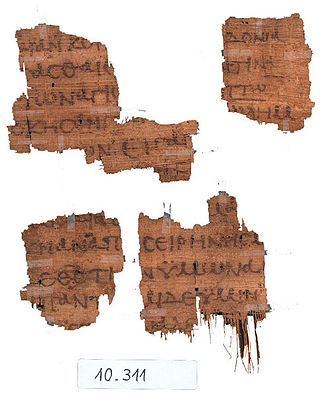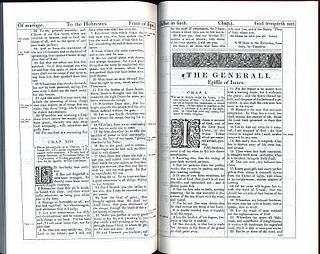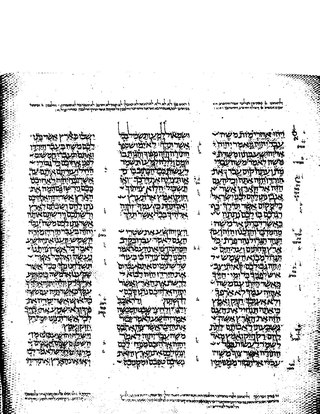Related Research Articles
The deuterocanonical books, meaning 'of, pertaining to, or constituting a second canon', collectively known as the Deuterocanon (DC), are certain books and passages considered to be canonical books of the Old Testament by the Catholic Church, the Eastern Orthodox Church, the Oriental Orthodox Church, and the Church of the East. In contrast, modern Rabbinic Judaism and Protestants regard the DC as Apocrypha.

Luke 4 is the fourth chapter of the Gospel of Luke in the New Testament of the Christian Bible, traditionally attributed to Luke the Evangelist, a companion of Paul the Apostle on his missionary journeys. This chapter details Jesus' three temptations, the start of his "Galilean Ministry", and his rejection at Nazareth, which Luke contrasts with his acclaim in nearby Capernaum.
Luke 20 is the twentieth chapter of the Gospel of Luke in the New Testament of the Christian Bible. It records the teaching of Jesus Christ in the temple in Jerusalem, especially his responses to questions raised by the Pharisees and Sadducees. The book containing this chapter is anonymous, but early Christian tradition uniformly affirmed that Luke the Evangelist composed this Gospel as well as the Acts of the Apostles.
The books of the Bible are the work of multiple authors and have been edited to produce the works known today. The following article outlines the conclusions of the majority of contemporary scholars, along with the traditional views, both Jewish and Christian.
The Old Testament is the first section of the two-part Christian biblical canon; the second section is the New Testament. The Old Testament includes the books of the Hebrew Bible (Tanakh) or protocanon, and in various Christian denominations also includes deuterocanonical books. Orthodox Christians, Catholics and Protestants use different canons, which differ with respect to the texts that are included in the Old Testament.

The term Catholic Bible can be understood in two ways. More generally, it can refer to a Christian Bible that includes the whole 73-book canon recognized by the Catholic Church, including some of the deuterocanonical books of the Old Testament which are in the Greek Septuagint collection, but which are not present in the Hebrew Masoretic Text collection. More specifically, the term can refer to a version or translation of the Bible which is published with the Catholic Church's approval, in accordance with Catholic canon law. The current official version of the Catholic Church is the Nova Vulgata.

1 Kings 3 is the third chapter of the Books of Kings in the Hebrew Bible or the First Book of Kings in the Old Testament of the Christian Bible. The book is a compilation of various annals recording the acts of the kings of Israel and Judah by a Deuteronomic compiler in the seventh century BCE, with a supplement added in the sixth century BCE. This chapter belongs to the section focusing on the reign of Solomon over the unified kingdom of Judah and Israel. The focus of this chapter is the reign of Solomon, the king of Israel.
Joseph Rawson Lumby (1831–1895) was an English cleric, academic and author and divine, Norrisian Professor of Divinity from 1879 and then Lady Margaret's Professor of Divinity from 1892.

Romans 11 is the eleventh chapter of the Epistle to the Romans in the New Testament of the Christian Bible. It is authored by Paul the Apostle, while he was in Corinth in the mid-50s AD, with the help of an amanuensis (secretary), Tertius, who adds his own greeting in Romans 16:22.

Romans 15 is the fifteenth chapter of the Epistle to the Romans in the New Testament of the Christian Bible. It is authored by Paul the Apostle, while he was in Corinth in the mid-50s AD, with the help of an amanuensis (secretary), Tertius, who adds his own greeting in Romans 16:22. According to Martin Luther,
In chapter 15, St. Paul cites Christ as an example to show that we must also have patience with the weak, even those who fail by sinning publicly or by their disgusting morals. We must not cast them aside but must bear with them until they become better. That is the way Christ treated us and still treats us every day; he puts up with our vices, our wicked morals and all our imperfection, and he helps us ceaselessly. Finally Paul prays for the Christians at Rome; he praises them and commends them to God. He points out his own office and the message that he preaches. He makes an unobtrusive plea for a contribution for the poor in Jerusalem. Unalloyed love is the basis of all he says and does.

Hebrews 13 is the thirteenth chapter of the Epistle to the Hebrews in the New Testament of the Christian Bible. The author is anonymous, although the internal reference to "our brother Timothy", caused a traditional attribution to Paul. This attribution has been disputed since the second century, and there is no decisive evidence for the authorship. This closing chapter contains the author's concluding exhortations, final benediction and epistolary postscript.
The following outline is provided as an overview of and topical guide to the Bible:

1 Chronicles 25 is the twenty-fifth chapter of the Books of Chronicles in the Hebrew Bible or the First Book of Chronicles in the Old Testament of the Christian Bible. The book is compiled from older sources by an unknown person or group, designated by modern scholars as "the Chronicler", and had the final shape established in late fifth or fourth century BCE. This chapter records the organization and departments of Levite temple musicians, from three main families and the drawing of lots to allocate individual musicians' duties. The whole chapter belongs to the section focusing on the kingship of David, which from chapter 22 to the end does not have parallel in 2 Samuel.

2 Chronicles 10 is the tenth chapter of the Second Book of Chronicles the Old Testament in the Christian Bible or of the second part of the Books of Chronicles in the Hebrew Bible. The book is compiled from older sources by an unknown person or group, designated by modern scholars as "the Chronicler", and had the final shape established in late fifth or fourth century BCE. This chapter belongs to the section focusing on the kingdom of Judah until its destruction by the Babylonians under Nebuchadnezzar and the beginning of restoration under Cyrus the Great of Persia. The focus of this chapter is the kingdom of Israel's division in the beginning of Rehoboam's reign.

1 Kings 4 is the fourth chapter of the Books of Kings in the Hebrew Bible or the First Book of Kings in the Old Testament of the Christian Bible. The book is a compilation of various annals recording the acts of the kings of Israel and Judah by a Deuteronomic compiler in the seventh century BCE, with a supplement added in the sixth century BCE. This chapter belongs to the section focusing on the reign of Solomon over the unified kingdom of Judah and Israel. The focus of this chapter is the reign of Solomon, the king of Israel.

1 Kings 20 is the 20th chapter of the Books of Kings in the Hebrew Bible or the First Book of Kings in the Old Testament of the Christian Bible. The book is a compilation of various annals recording the acts of the kings of Israel and Judah by a Deuteronomic compiler in the seventh century BCE, with a supplement added in the sixth century BCE. This chapter belongs to the section comprising 1 Kings 16:15 to 2 Kings 8:29 which documents the period of the Omrides. The focus of this chapter is the reign of king Ahab in the northern kingdom.

1 Samuel 14 is the fourteenth chapter of the First Book of Samuel in the Old Testament of the Christian Bible or the first part of the Books of Samuel in the Hebrew Bible. According to Jewish tradition the book was attributed to the prophet Samuel, with additions by the prophets Gad and Nathan, but modern scholars view it as a composition of a number of independent texts of various ages from c. 630–540 BCE. This chapter contains Saul's actions against the Philistines. This is within a section comprising 1 Samuel 7–15 which records the rise of the monarchy in Israel and the account of the first years of King Saul.

Joshua 24 is the twenty-fourth chapter of the Book of Joshua in the Hebrew Bible or in the Old Testament of the Christian Bible. According to Jewish tradition the book was attributed to Joshua, with additions by the high priests Eleazar and Phinehas, but modern scholars view it as part of the Deuteronomistic History, which spans the books of Deuteronomy to 2 Kings, attributed to nationalistic and devotedly Yahwistic writers during the time of the reformer Judean king Josiah in 7th century BCE. This chapter records Joshua's final address to the people of Israel, that ends with a renewal of the covenant with YHWH, and the appendices of the book, a part of a section comprising Joshua 22:1–24:33 about the Israelites preparing for life in the land of Canaan.

Joshua 4 is the fourth chapter of the Book of Joshua in the Hebrew Bible or in the Old Testament of the Christian Bible. According to Jewish tradition the book was attributed to Joshua, with additions by the high priests Eleazar and Phinehas, but modern scholars view it as part of the Deuteronomistic History, which spans the books of Deuteronomy to 2 Kings, attributed to nationalistic and devotedly Yahwistic writers during the time of the reformer Judean king Josiah in 7th century BCE. This chapter focuses on the Israelites crossing the Jordan River westward into the land of Canaan under the leadership of Joshua, a part of a section comprising Joshua 1:1–5:12 about the entry to the land of Canaan.

Joshua 20 is the twentieth chapter of the Book of Joshua in the Hebrew Bible or in the Old Testament of the Christian Bible. According to Jewish tradition the book was attributed to Joshua, with additions by the high priests Eleazar and Phinehas, but modern scholars view it as part of the Deuteronomistic History, which spans the books of Deuteronomy to 2 Kings, attributed to nationalistic and devotedly Yahwistic writers during the time of the reformer Judean king Josiah in 7th century BCE. This chapter records the designation of the cities of refuge, a part of a section comprising Joshua 13:1–21:45 about the Israelites allotting the land of Canaan.
References
- ↑ Preface by the General Editor, accessed 12 March 2016
- ↑ Logos.com, Cambridge Bible for Schools and Colleges: Matthew, accessed 30 August 2024
- ↑ Plummer A. (1892), Cambridge Bible for Schools and Colleges: The Epistles of S. John, accessed 16 May 2020